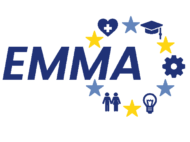The first face-to-face multiplier event (ME) was organised in the premises of the Department of Nursing, National and Kapodistrian University of Athens on the 20th of May 2022. In this event 34 persons participated representing academics, possible students, older people and employers. Also, 9 participants from the partner universities and 5 from the organising university (NKUA) team members.
During this ME, there was planned to present and discuss the progress of the project and, more specifically, the content, the mode of delivery and the evaluation process.
The ME was organised for Friday afternoon and included a get to know each other meeting, presentations of the work done in the project so far and extensive discussion with participants to get their opinion, critique and proposals on this work.
The ME was organised in two parts; during the first, the progress was presented by partners from different universities, while the second it focused on the presentation of the evaluation process and the discussion with stakeholders.
In the first presentation, Raija Kuisma, coordinator of the Emma Project from Karelia University of Applied Sciences, gave an analytic insight in the project design, objectives, challenges and expected results of the EMMA project. She also presented the European Master on Active Ageing and Age-Friendly Society framework based on EU guidelines and respecting national requirements.
Suzanne Timmons from University College Cork and Andrea Stitzel from Carinthia University of Applied Sciences presented the programme’s content as it was discussed during the last months and during the Athens TPM meeting. The content has been organised at three levels – core modules, the core of choice modules and elective modules to facilitate the needs of students from different backgrounds and varying interests regarding older people,– in accordance with EU guidelines for master studies. This graphical presentation gave food for thought and discussion with the ME participants.
Emmanouil Zoulias from the National and Kapodistrian University of Athens (NKUA) presented the ongoing work for the implementation and integration for the EMMA master LMS platform. He presented the different LMS platforms that EMMA’s project partner Universities use. Furthermore, he presented the interoperability solution proposed by the technical partners of the consortium to be used in the EMMA LMS technical solution, which is the Learning Tools Interoperability (LTI). In addition to that, a scenario for user’s connection in EMMA’s LMS was presented as a live scenario. As a result, the audience had the opportunity to see live the link among different LMS platforms. Furthermore, he presented the discussion about how these different platforms can be linked together effectively and securely so that students from different countries can register, study and evaluate/be evaluated by using existing platforms, while teachers from different HEIs use the already known LMS.
Then a Q&A session took place where participants had the opportunity to ask questions about the work completed so far.
Following a short break, Olympia Konstantakopoulou from NKUA presented the evaluation process as it is being designed. In this, she linked the steps of the process according to international literature and European guidelines. The framework of this process as well as the tools that will be used by different stakeholders to validate the value and success of the study programme were presented in more detail so that participants could be able to comment and perhaps provide the research team with new ideas to be discussed within the team and incorporate them in the process.
Panayota Sourtzi then opened and chaired an open discussion during which several participants expressed their views on the project as a whole; there were, however, questions and comments on the evaluation process, which were recorded so that the existing method could be informed:
- A major issue that was discussed referred to the need of taking into consideration the interdisciplinary element for the evaluators’ team;
- The technical expertise of people working in different fields with the elderly, both in the public and private sector, should be combined along with the experience accumulated from the elderly as the “end users’” experience regarding their needs, especially with regard to critical interventions that will be added as part of the curriculum (360o evaluation process);
- External evaluators of the project should be involved in the development of the course content from early on in order to be able to make a difference through their experience;
- Also, it was highlighted as rather important that evaluators should be able to know from early on as well the exact definitions of the evaluation content as well as for the evaluators’ profile to be particularly specified;
- The consortium should consider to add an experiential summer course;
- Finally, it was considered crucial for the successful implementation of the program that issues such as the elderly rights, sexual life, spirituality, end of life care and mental health should be taken into account while formulating the program content.
All in all, many of the participants showed interest and consented to participate in the following invitations regarding the pilot evaluation of the project.
Take-home messages
- Successful collaboration of various professionals/academics from different countries can produce a common and valuable master’s programme.
- Transdisciplinary focus on developing the curriculum framework, content, and evaluation methods, can support a holistic focus on active and healthy ageing.
- Existing university platforms can be linked to provide a unified system for students’ access and study online.
Author information:
Olympia Konstantakopoulou, Panayota SourtziDaphne Kaitelidou Sector of Public Health, Department of Nursing, National and Kapodistrian University of Athens, Athens, Greece


